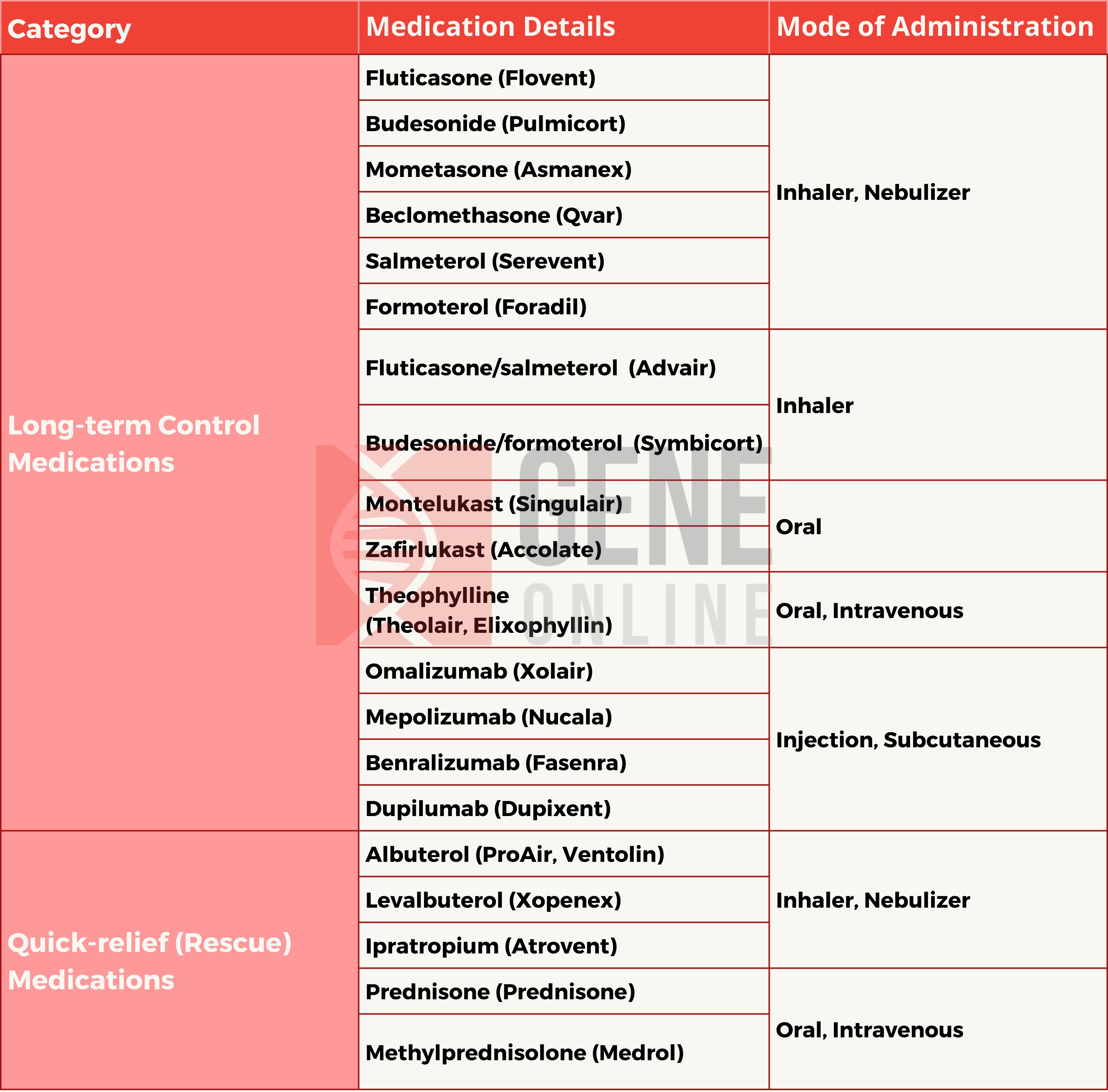Asthma Medications: From Quick Relief to Long-Term Control
Asthma, a chronic respiratory condition marked by inflammation and constriction of the airways, poses a significant health challenge. Managing asthma successfully often hinges on understanding and appropriately utilizing the array of medications available.

Quick-Relief Medications for Asthma
At the forefront of asthma management are quick-relief or rescue inhalers. Short-acting beta-agonists (SABAs), the cornerstone of this category, act swiftly to relax airway muscles, providing almost immediate relief from hallmark symptoms like wheezing, coughing, and breathlessness.
Albuterol, a frequently prescribed SABA, stands as a testament to their effectiveness. In some cases of severe asthma attacks, anticholinergics further aid in breathing by loosening and widening the airways.
Long-Term Control Medications
While rescue inhalers offer respite during acute episodes, preventing these attacks stands as the primary goal of long-term asthma management. This is where inhaled corticosteroids (ICS) shine. Through their anti-inflammatory actions, ICS reduce airway swelling and sensitivity, making them the gold standard for most asthma patients. Fluticasone, budesonide, and mometasone are common examples of ICS medications.
Another class of preventive medications, leukotriene modifiers, exert their effects by blocking leukotrienes, substances responsible for airway inflammation. Montelukast is a well-known oral medication within this group.
For some individuals, long-acting beta-agonists (LABAs) offer additional control. Acting as bronchodilators over an extended duration, LABAs like salmeterol and formoterol offer sustained airway relaxation. Critically, LABAs are always prescribed in combination with an ICS to address underlying inflammation. To streamline treatment, combination inhalers conveniently package both an ICS and a LABA into a single device.
Role of Biologics in Severe Asthma
In certain cases of severe, treatment-resistant asthma, a newer class of medications called biologics is considered. Administered by injection, these targeted therapies work by influencing specific components of the immune system involved in the asthmatic response.
Biologics such as Omalizumab (Xolair), which targets IgE to reduce the immune system’s response to allergens, along with Mepolizumab (Nucala), Reslizumab (Cinqair), and Benralizumab (Fasenra), which focus on interleukin-5 (IL-5) to mitigate eosinophil activity, play a crucial role in managing asthma.
These eosinophils are white blood cells that contribute to the disease’s pathophysiology. Additionally, Dupilumab (Dupixent) addresses asthma by inhibiting interleukin-4 and interleukin-13 (IL-4, IL-13), key cytokines in the inflammatory pathway. Tezepelumab (Tezspire) blocks a protein called thymic stromal lymphopoietin (TSLP), which plays a role in initiating and maintaining airway inflammation. Collectively, these biologics offer targeted interventions for asthma, aiming to alleviate symptoms by addressing specific inflammatory processes underlying the condition.
Creating a Personalized Asthma Management Plan
It’s imperative to remember that successful asthma treatment is not just about the medications themselves. Developing a personalized asthma management plan in collaboration with your doctor is key. In this plan, your medications, triggers, and strategies for addressing attacks are clearly outlined. Moreover, mastering proper inhaler technique is paramount for the drugs to reach their intended targets within the lungs. Lastly, open communication with your doctor about any bothersome side effects ensures timely adjustments to your treatment approach.
Conclusion and the Importance of Adherence
While no cure exists for asthma, the effective interplay of rescue and preventive medications can bring its symptoms under control. Adhering to your prescribed treatment plan, developed in partnership with your physician, enables you to breathe easier and live a full, active life.
Note: This table is not exhaustive and the availability of medication names and brands may vary by country. Medications should be chosen based on individual patient needs, severity of asthma, and under the guidance of a healthcare professional.
Long-term control medications are typically used on a daily basis to maintain control over chronic asthma, while quick-relief medications are used to rapidly alleviate symptoms during an asthma attack. Combination inhalers provide the benefit of two medications in one inhaler, usually an inhaled corticosteroid and a long-acting beta agonist (LABA).
It’s crucial for patients to follow their asthma action plan, as prescribed by their healthcare provider, to effectively manage their asthma.
©www.geneonline.com All rights reserved. Collaborate with us: service@geneonlineasia.com








